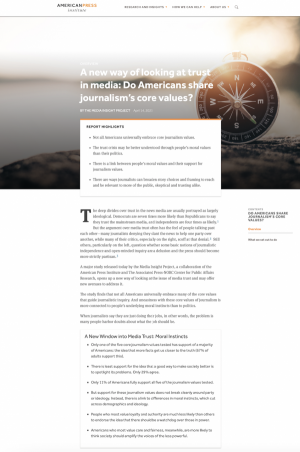Media Insight Report Overview
As part of a new study released on 14 April by the Media Insight Project, a collaboration of the American Press Institute and The Associated Press-NORC Center for Public Affairs Research it has been tested whether or not Americans share journalism’s core values. According to the creators of the project their findings opens up a new way of looking at the issue of media trust and may offer new avenues to address it.
In the following we sketch out the highlights of their overview article “A new way of looking at trust in media: Do Americans share journalism’s core values?“
Only around one third (29%) of Americans support the traditional journalism focus on bad news, the belief that “a good way to make society better is to spotlight its problems.”
This is according to a study released by the Media Insight Project, a collaboration of the American Press Institute and The Associated Press-NORC Center for Public Affairs Research.
Tom Rosenstiel is Executive Director for the American Press Institute and one of the most recognized thinkers in the country on the future of news.
“We tend to think that stories that celebrate the good things in society are soft stories, kind of wimpy,” he said. “But they may be more important than we think in providing a full and accurate picture of the world.” Tom said
The survey tested for attitudes to 5 foundational journalism values:
- Factualism: This is the idea that the more facts people have, the closer they will get to the truth. The inverse is that for a lot of things that matter, more facts will only get you so far in understanding any situation.
- Giving voice to the less powerful: This measures whether people want to amplify the voices of people who aren’t ordinarily heard, or think that is overdone and favoring the least fortunate doesn’t help them.
- Social criticism: This value measures how people feel about the importance of casting a spotlight on a community’s problems to solve them versus celebrating what is right and working well to reinforce the good things.
- Oversight: This value measures how strongly a person feels the need to monitor powerful people and know what public officials are doing. The flip side would be that people need to trust leaders to do their jobs, and that people in positions of authority need the privacy to do some things behind closed doors to fulfill their duties.
- Transparency: This is the idea that society works better when information is out in the open and the public knows what is happening. The other side of this value emphasizes how sometimes all of the information cannot be released specially without the right context. Too much information can hinder progress and leave room for gross misinterpretation.
Only 11% of Americans fully support the five core journalism values that were tested.
Writers of the research conclude that “The problem at the heart of the media trust crisis may be skepticism about the underlying purpose and mission journalists are trying to fulfill”
Only one of the five core journalism values tested has support of a majority of Americans, factualism, the idea that more facts get us closer to the truth (67% of adults support this).
Support for journalism values was not predicated around political affiliation or ideology. It was the moral values of people that had the most impact. Those who valued “loyalty” and “authority” were the least likely to support the watch dog role of the media.
Here we collect our latest news in order for you to stay updated on everything constructive institute, constructive journalism and constructive fellowships.

